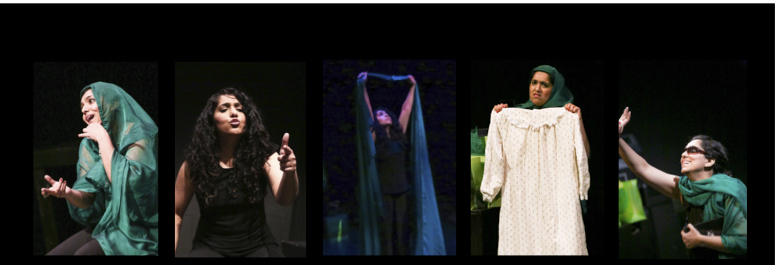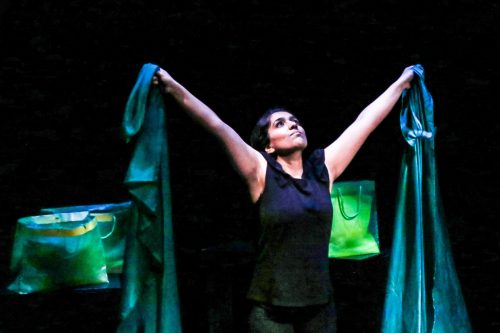
Aizzah Fatima’s play “Dirty Paki Lingerie” is continuing its run around the world, having already played at New York’s Flea Theater, at the Edinburgh Fringe Festival, in Pakistan, Turkmenistan, and Toronto, to name a few locations. Fatima is a writer and actor based in New York City, and her current show presents a series of shorts featuring various Pakistani-American characters, interspersed with lines of poetry from Mirza Ghalib and dance sequences to Justin Timberlake.
A green sash is draped from the ceiling in a corner of this stage, which acts as the centerpiece for Fatima’s movement across characters, ranging from a 6-year-old watching “Dora the Explorer” to a woman in her 60s giving advice to a young daughter.
In one particular moment, the azaan rings out, and it’s perfectly benign and beautiful—I’ve heard it more times than I can remember, more often than not, in private with family members and friends as we’re opening a fast or go about our everyday business. In the public sphere, if the azaan is heard, you’re usually near a mosque, watching another documentary “exposing” something tired about Muslims, listening to incendiary news reports or hearing it used as a call to exoticization and mystery. Here, however, as with many other moments in the show, the effect is to take a simple part of many Muslim-Pakistanis lives and make it an everyday thing in the private sphere.
Dreams of moving to America, the realities of living in America, the desire to please a husband versus the desire to succeed academically, married life, contemporary Pakistani lives and older generational differences are played out through the various characters, and overwhelmingly, Fatima’s approach is one that takes in stereotypes and crushes them into flowers. The snapshots speak of an attitude that realizes as if any Pakistani-Muslim of any nationality can escape it, that political backgrounds, post-9/11 environments, and stiflingly intricate stereotypes can be put to one side. They do not become the sum of your parts: whilst these elements intervene, they aren’t an inherent part of existing as a Pakistani Muslim.
Fundamentally, that was the most powerful part that I took away from the performance. Fatima and director Erica Gould constructed a piece that is funny, serious, heart-breaking, identifiable but also, importantly, a blistering and complex rejection of intensity in favor of a calm and humanizing approach. Showing women warned by their parents of what happened “after 9/11” takes an overwhelmingly prevalent backdrop of many Muslim lives on the one hand and in the other hand, it brings in a number of other snapshots that places the person back into the “Pakistani-American” perspective—be it about anti-blackness, generational differences that span countries, waxing off pubes, sexuality, colorism and popular culture.
That is an incredibly difficult thing to do. It is difficult to breathe in the swarm of expectations and presumptions facing Pakistani people, and yet, Fatima creates a piece that confronts all the “hot button issues” without being solely about them. It is really about small moments in the lives of Pakistani-American women; different women at different stages with wildly different stories and outlooks. It is about being. Being people who have shared and varying experiences; people who can’t neatly be put into a box; people who have a range of cultural references that span 18th-century poets, Britney Spears and “To Kill A Mockingbird.”
A line that resonated with me was when Hiba, a wife, mother, and teacher in her fifties proclaims, “I’m tired of worrying about what respectful Muslim daughters should and shouldn’t do.” It was genuinely bewildering to see an example of the representation of Muslim-Pakistani women who were specifically humanized and were emotional, physical, sexual beings in addition to being concerned about politics. Hiba conveyed her regrets in life as it had come to pass, but also her hopes for the future and her decision to live her life on her own terms. The moment spans across often-represented cultural, social and political spheres but doggedly focuses on everyday, lived moments that focus in, rather than generalize out. In such seemingly simple lines, Fatima imbues her characters with a specific humanity that achieves what few other sources of representation have managed since 9/11 – a focus on the everyday humanity and daily lives of women who are often sidelined, erased and forgotten.

We spoke to Fatima for some valuable insight into the workings behind her performances:
It seems like the green scarf that ties together the various characters in your performance was a nod to the persistent ubiquity of scarves/veiling when it comes to discussing Muslim culture, whilst making it only one element of the show. Where did the idea for it come from, and how central do you feel it is to your stagecraft?
The scarf is often seen as a sign of oppression in Western cultures when a Muslim woman chooses to cover her hair with it. When a nun covers her hair, she is pious. However, a Muslim woman who covers her hair is seen as oppressed. I wanted to turn this stereotype on its head and reclaim the use of the veil as it pertains to Muslim culture. It is used by the opinionated college-aged Selma as a headscarf to assert her feminism and activism. The same piece of cloth, when worn by six-year-old Zara, becomes a playful sash, a winter scarf when Raheela ties it around her neck at the airport, and a part of her cultural identity when sixty-five-year-old Asma places it loosely on her head as she goes about her daily routine. As the play captures the diversity of women’s experiences that exist within Muslim cultures, the same piece of fabric is used in different ways to transition between characters. Parts of the play move very quickly, and using the same piece of fabric allows us to move quickly between characters.
Was it important for you to marry references to Mirza Ghalib alongside references to Britney Spears and Justin Timberlake?
One of the themes in the play is the pull between the old culture and the new for first and second-generation Muslim-Americans. This is true of any immigrant population, and not just Muslims. The pull of the culture where your ancestors come from, and the need to assimilate to the culture where you now reside. Just as lyrics from songs of Britney Spears and Justin Timberlake speak to a generation, the text from Mirza Ghalib’s Urdu poetry is just as relevant today to women and people everywhere as it was in the time it was written. You can not move forward without understanding your past.
What has been your favorite audience reaction so far?
Having an engaged audience is essential to solo performance since they are my scene partners in the play. I’m always moved when people tell me that the Muslim-American-Pakistani female characters they saw reminded them of their mother, aunt, sister, or more recently someone’s Scottish father. However, a few times now people have told me they were inspired to create a solo show and tell their own story after watching ‘Dirty Paki Lingerie.’ When you belong to any minority community, it’s important to tell your own story. In the absence of you telling your story, others will tell it for you. If the play inspires just one person to share their story with the world, then I’ve done my job.
 Maryam Jameela lives in Lancashire, England. She graduated with a B.A. in English literature and an M.A. in gender studies. She is passionate about writing all things desi and will begin her Ph.D research into desi film and literature at the University of Sheffield, U.K. in the fall. You can read more things that she has written here.
Maryam Jameela lives in Lancashire, England. She graduated with a B.A. in English literature and an M.A. in gender studies. She is passionate about writing all things desi and will begin her Ph.D research into desi film and literature at the University of Sheffield, U.K. in the fall. You can read more things that she has written here.




